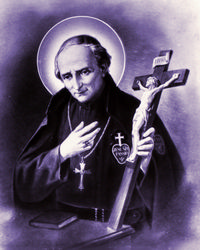Lives of the Saints
Our Models and Protectors
Spiritual Bouquet:
September 25

Saint Vincent Strambi
Passionist Priest,
Bishop of Macerata and Tolentino
(1745-1824)
Born in 1745 at Civitavecchia near Rome, the son of a wealthy businessman, Saint Vincent Strambi never showed any inclination for any occupation other than the service of God. He found his vocation when after his ordination as a deacon in 1767, he made a retreat amid the Passionists of Monte Fogliano, where Saint Paul of the Cross, their founder, was residing at the time. The Passionist houses are called retreats, and by their Rule must be situated outside cities. Saint Paul of the Cross told his brethren on his deathbed, as he had taught them during his active years, to conserve always the spirit of prayer, solitude and poverty; in that way the apostolic success of their works would also be conserved. The life of contemplation, essential formation for any fruitful works, was what Saint Vincent Strambi already desired.
It was formally declared by his last secretary, Monsignor Catervo Serrani, that it would not be temerity to believe that he knew by heart all the works of Saint Thomas Aquinas. The same might have been said of his knowledge of Sacred Scripture. His studies of religion, ever an inexhaustible wealth, continued throughout his lifetime, yet his preaching was so simple that all could easily grasp his thought. He never used notes, but taught according to the needs of his listeners, which he always discerned with exactitude after praying intently at the foot of the crucifix. As he studied, he seemed to see around his desk the faces of his spiritual children, waiting for the bread of life he was destined to break for them. This method of study has been preserved among his followers in the Order; the Passionists think of, and pray for, their future spiritual children before they study.
Saint Vincent became a bishop after many years of preaching missions all over Italy. But never could he forget his Order, though he had to put aside its habit. Saint Paul of the Cross on his deathbed had said to him several times: Padre Vincenzino, I recommend to you the poor Congregation. When Saint Vincent asked what he wished him to do, Saint Paul replied: You will do great things! You will do great good! I recommend to you this poor Congregation!
As bishop of Macerata and Tolentino, he continued whenever possible to rise at midnight for the divine office, and regretted being unable to dedicate more than five hours to prayer each day. He called in the poor and gave them alms; he visited the hospitals and the prisoners, blessed, embraced and helped them. He visited every religious house of his diocese, then the Canons and the parish priests. He preached for his clergy a beautiful mission, then organized specialized services for the various professions of the laity, saying, the lawyers need different instruction and different sowings than the merchants or the physicians, for example; to each his own portion of the truth! His table was very frugal; never did he permit more than two dishes. He reduced expenditures to a minimum, to be able to give more to the poor.
He wished to resign as bishop at the age of seventy-eight, and Pope Leo XII ceded to his wish, but asked him to come to Rome as his counselor. That his life was soon to end was revealed to him, and when the Holy Father was about to die that same year, he offered his life to save that of the Vicar of Christ. He did not say so directly, but told everyone not to be anxious, because the Pope would live. Someone he knew had offered his life for him, he added. The prayer was answered on the very day he said this, December 24th; the Pope rose, suddenly cured. Three days later Saint Vincent was struck by apoplexy, and died on January 1, 1824. He was canonized by Pope Pius XII in 1950.
Saint Vincent-Marie Strambi, Passioniste, by Maria Winowska (Éditions Passionistes: Nantes, 1951).